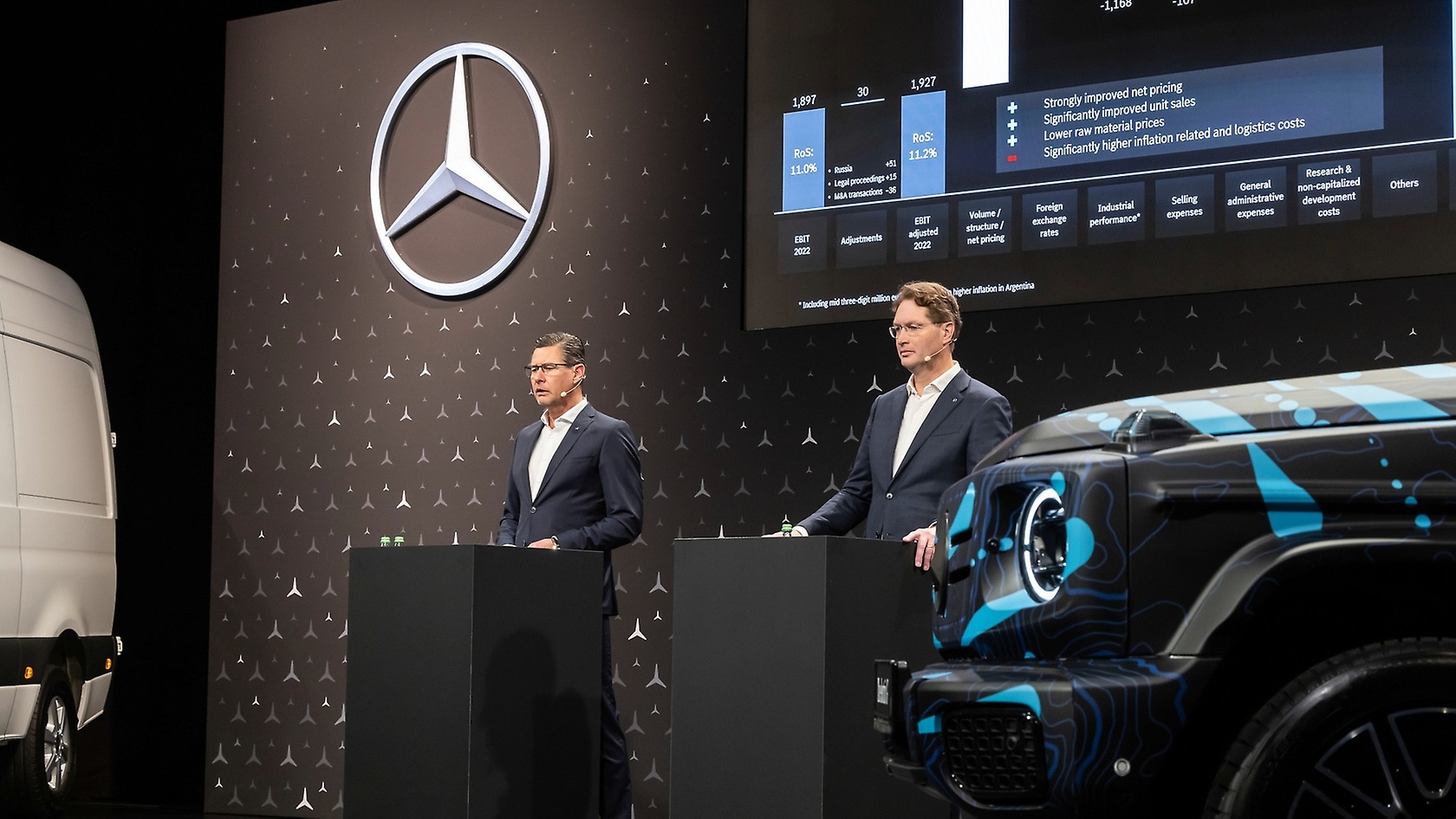February 22, 2024 – Mercedes-Benz Group AG achieved solid 2023 financial results. A sharpened focus on desirable cars and vans combined with ongoing cost discipline resulted in Group Earnings Before Interest and Taxes (EBIT) of €19.7 billion (2022: €20.5 billion), and revenues of €153.2 billion (2022: €150.0 billion).
For 2023, Mercedes-Benz Cars delivered an adjusted Return on Sales (RoS) of 12.6%, Mercedes-Benz Vans an adjusted RoS of 15.1%, and Mercedes-Benz Mobility an adjusted Return on Equity (RoE) of 12.3%, in a challenging environment marked by supply-chain constraints as well as geopolitical and macroeconomic volatility.
Recordings of the analyst and media Q&A sessions can be found further down on this page.
Key figures 2023
2.49mn
Group Unit Sales
2022: 2.45 mn
€ 153.2bn
Revenue
2022: € 150 bn
€ 19.7bn
EBIT
2022: € 20.5 bn
€ 11.3bn
Free Cash Flow Ind. Business
2022: € 8.1 bn
€ 13.46
Earnings per share
2022: € 13.55
€ 5.30
Dividend
2022: € 5.20
Dividend: Subject to approval by the shareholders at the annual meeting 2024.

Mercedes-Benz continued its transformation in 2023, developing new cutting-edge electric and digital innovations, while scaling electric vehicles and delivering solid financial results. In other words, the team once again came through to execute our strategy in challenging times, delivering the eSprinter and the new E-Class. At the same time, we prepared the ground for next-generation products and platforms like VAN.EA and MB.OS. to keep Mercedes-Benz at the forefront of the industry.
Ola Kaellenius
Chief Executive Officer of Mercedes-Benz Group AG

Investments, free cash flow and net liquidity
The Free Cash Flow of the Industrial Business reached €11.3 billion (2022: €8.1 billion) mainly due to high profitability, a high cash conversion rate and lower working capital. The Net Liquidity of the Industrial Business rose to €31.7 billion (end of 2022: €26.6 billion). Group investments in property, plant and equipment in the full year totaled €3.7 billion (2022: €3.5 billion). Research & Development expenditure amounted to €10.0 billion (2022: €8.5 billion).
Transformation
Mercedes-Benz gained certification for its SAE Level 3 conditionally automated driving system for use on freeways in Nevada and California and received permission to test its L3 systems on highways in Beijing. These innovations come ahead of the introduction of its operating system MB.OS which will be launched with the new Mercedes-Benz Modular Architecture (MMA) which sets new efficiency benchmarks. Mercedes-Benz started its rollout of a dedicated high-power charging network, with sites opening in China, the U.S. and Germany. The company also continued expanding its direct sales model including most recently in Thailand. Direct sales is now live in 11 markets and covers more than 50% of sales in Europe and more than 30% in the Overseas region.
Divisional results
The adjusted Earnings Before Interest and Taxes at Mercedes-Benz Cars reached €14.3 billion (2022: €16.2 billion) and the adjusted Return on Sales resulted in a solid 12.6% (2022: 14.6%). Hereby, tailwinds from net pricing, lower raw material prices and improved manufacturing costs were outweighed by higher inflation charges and supply-chain related costs.
Research and Development costs rose for future platforms and technologies, particularly for MB.OS. Net pricing increased significantly with the average sales price up 2% to €74,200 in 2023 and remained positive on a healthy level also in the fourth quarter.
Overall sales volumes remained flat, reaching 2,044,100 units in 2023 and included a sales increase for Mercedes-Maybach (+19%), G-Class (+11%) and Mercedes-AMG (+4%). The model mix remained flat, but on a high level, with Top-End vehicle sales reaching 328,300 last year. The S-Class remains the undisputed leader in its segment, retaining its market share with around 50% in all key regions. Battery electric vehicles now account for 12% of overall Mercedes-Benz Cars sales with Mercedes-Benz reaching the highest share of EV’s among all traditional foreign OEMs in the United States in 2023.
The adjusted Cash Flow Before Interest and Taxes (CFBIT) of Mercedes-Benz Cars increased by 10% to €12.5 billion in 2023 (2022: €11.4 billion) due to improved working capital, resulting in a favorable adjusted Cash Conversion Rate of 0.9 compared to 0.7 last year.
Revenue at Mercedes-Benz Vans rose by 18% to €20.3 billion (2022: €17.2 billion) and adjusted EBIT increased 59% to €3.1 billion (2022: €1.9 billion) year-on-year, as unit sales improved 8% to a record 447,800 units (2022: 415,300 units).
The strong financial performance is a result of strong product substance, a healthy price premium and product mix, robust net pricing and lower raw material costs. These factors, combined with efficiency measures, helped to offset higher inflation-related and logistic costs. In line with the value growth strategy to focus on premium segments, large Vans dominated sales, resulting in record sales in the U.S., the Sprinter leading its segment in Europe and Mercedes-Benz Vans leading the market in Germany. With 237,400 large, 178,900 mid-size and 31,500 small vans sold, Mercedes-Benz Vans achieved its best annual result to date in each segment.
In the United States, sales grew by 13% to an annual record of 75,100 units. With around 22,700 eVans, sales of electric vans increased by 51% in 2023, accounting for 5% of total sales. Last year also saw the premiere of the new eSprinter and the facelift of the mid-size van portfolio. With the eCitan, EQT (WLTP: combined electricity consumption 100 kWh/km: 20,7-19,3; combined CO2 emissions: 0 g/km), eVito, eVito Tourer, EQV and eSprinter, Mercedes-Benz Vans offers each model also as an all-electric version since 2023. Research and development costs increased due to an investment focus on Van Electric Architecture (VAN.EA). Investments into property, plants and equipment rose as plants were retooled to build the new eSprinter and the facelift of the mid-size vans and to build the all-new generation of electric vans. Full year the adjusted cash flow surged by 48% to €3.0 billion (2022: €2.0 billion), resulting in a strong adjusted Cash Conversation Rate of 1.0 (2022: 1.1).
Mercedes-Benz Mobility saw new business increase by 7% to €62.0 billion (2022: €58.0 billion) in a competitive market environment with above average penetration rates for financed or leased electric vehicles. The total portfolio grew in 2023 to €135.0 billion (2022: €132.4 billion). Performance was impacted by a lower portfolio margin due to higher refinancing rates and intensified competition in the financial services sector, resulting in adjusted Earnings Before Interest and Taxes of €1.7 billion (2022: €2.4 billion). The expenses for the establishment of charging activities also had an effect on EBIT. The charging business continued its global ramp up with high-power charging stations opening in Germany, the U.S. and China. As a result, the adjusted Return on Equity (RoE) was at 12.3% (2022: 16.8%).
Dividend
At the Annual General Meeting on May 8, 2024, the Board of Management and the Supervisory Board will propose a dividend of €5.30 per share (2022: €5.20). This proposal also reflects the Earnings per Share (EPS) accretion effect of the current share buyback program.
Share buyback policy
Mercedes-Benz has resolved to implement a new buyback policy. Any future free cash flow from the industrial business as available (post potential small-scale M&A) beyond the approx. 40 percent dividend payout ratio of Group Net Income, shall be used to fund share buybacks with the purpose of redeeming shares.
In this context, Mercedes-Benz has also announced an additional share buyback program to repurchase own shares worth up to €3 billion (not including incidental costs) on the stock exchange. The repurchased shares shall subsequently be cancelled.
The buyback will be based on the authorization by the Annual General Meeting of Mercedes-Benz Group AG on July 8, 2020, allowing the Board of Management to acquire, with the approval of the Supervisory Board, own shares up to a maximum of ten percent of the share capital until July 7, 2025. The buyback will commence immediately after the conclusion of the ongoing share buyback program announced on February 16, 2023, and is expected to be completed before the expiry of the Annual General Meeting’s current authorization.
The company intends to ask for a renewal of the authorisation for Share Buybacks at the Annual General Meeting in 2025 to further continue Share Buybacks in line with the company’s Share Buyback policy. This Share Buyback policy targets continuous growth of Earnings Per Share (EPS) and Dividend Per Share (DPS) over the next years. With any Share Buyback Program the company will keep flexibility on the execution in case of unexpected market developments.
The figures in this article are preliminary and have neither been approved yet by the Supervisory Board nor audited by the external auditor.



